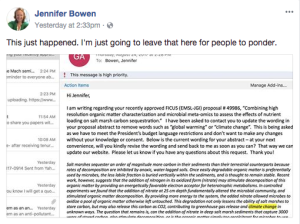
It's no secret that President Trump came into office rejecting the conclusions of the vast majority of the world's scientists when it comes to our changing climate. But it wasn't clear how that would translate to policy. At least some of his advisors, as well as his daughter, accept the conclusions of the scientific community. And there was the possibility that policy decisions would be constrained by reality, as Trump was sworn in as the most recent global temperature records were set.
Over the past few weeks, however, it has become increasingly clear that there has been extensive push back against climate change throughout the government, with several push backs occurring in the last week alone. We'll review those briefly below.
The grid and the grant

But the report is also notable for avoiding the use of the term "climate change" anywhere in its 125 pages. This is despite the fact that increased heat will boost demand and stress grid hardware and that climate change is currently driving state-level energy policies. In fact, the report recommends the anti-solution of increasing the use of coal-fired power plants.
Amazingly, however, that report was not what drove the DOE to deny that it had banned the use of the term "climate change." Instead, that was triggered by Jennifer Bowen, a biology researcher at Northeastern University whose research is funded in part by the DOE. On Thursday, Bowen posted a screenshot of correspondence she received from the office at the DOE responsible for her grant. The e-mail reads in part:
I have been asked to contact you to update the wording in your proposal abstract to remove words such as "global warming" or "climate change." This is being asked as we have to meet the President's budget language restrictions and don't want to make any changes without your knowledge or consent.
We contacted Bowen to ask for more details but received a response from a Northeastern University spokesperson instead. He relayed the university's statement on the matter: "A long-standing pillar of the US research model is the belief that science should not be constrained or influenced by partisan politics. As a university, we will continue our steadfast commitment to intellectual inquiry and will follow the facts, wherever they may lead.”
E&E News contacted the DOE, which denied that it had a blanket prohibition on the term "climate change." But Nature News identified a second researcher who had received funding from the same DOE program and has also been asked to remove references to climate change from his grant's abstract.
NIH, EPA, and NOAA
It's not just the DOE that seems to have issue with this area of science. Perhaps the most significant move happened at the National Oceanic and Atmospheric Administration (NOAA). NOAA is one of the organizers of a congressionally mandated national climate assessment, and it maintained a 15-person advisory committee intended to help the business community as well as state and local governments use the assessment for planning. In other words, the committee was intended to help the nation decide how best to act on the information contained in a scientific report.
The committee was formed in 2016 in expectation of the completion of the next climate assessment, due this year. Last week, however, its charter expired and the Trump administration decided not to renew it.
Meanwhile, the assessment itself has become a battleground. Drafts of the assessment have been through scientific peer review and have been circulated widely. They largely echo the conclusion of other scientific evaluations of the climate, such as the IPCC's.
But Scott Pruitt, head of the EPA (one of the organizations tasked with writing the assessment), is now threatening to derail its formal release. Apparently unaware that the grant has already been reviewed, Pruitt told a radio host that "Frankly this report ought to be subjected to peer-reviewed, objective-reviewed methodology and evaluation." While speaking of the assessment, he also warned against science being "politicized," though he did not appear to identify what was threatening to do so.
His call for a re-review of the climate assessment may provide Pruitt an opportunity to try out one of his ideas: a "red team" evaluation that he hopes would poke holes in mainstream science.
In this environment, even minor actions are attracting suspicion. The National Institute of Environmental Health Sciences (part of the National Institutes of Health) underwent a redesign this week in which a single word was targeted: "change." Headline-level references to climate change were altered to simply say "climate," although the information they linked remained intact and continued to refer to climate change. The organization's director of communications downplayed the significance of the change.
It's difficult to tell what the significance of some of these actions are. It's clear that Perry and Pruitt, who head DOE and EPA, are perfectly willing to overrule expert conclusions and scientific findings when it suits them. (Although Pruitt has still not attempted to throw out the EPA's greenhouse gas endangerment finding, so there are limits.) But below them and at other agencies, decisions may be driven in a haphazard manner by either minor political appointees or career administrators. And these individuals may be motived by anything from personal beliefs to a desire to please their agency heads to the hope to avoid negative attention from their superiors.
reader comments
383